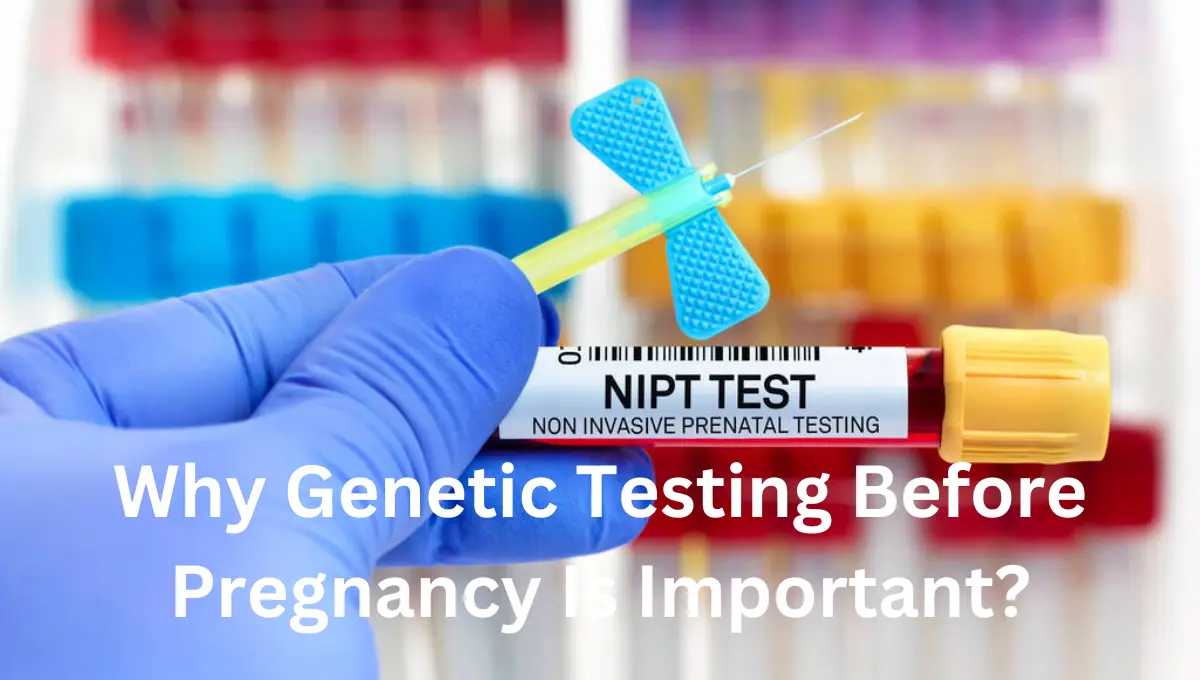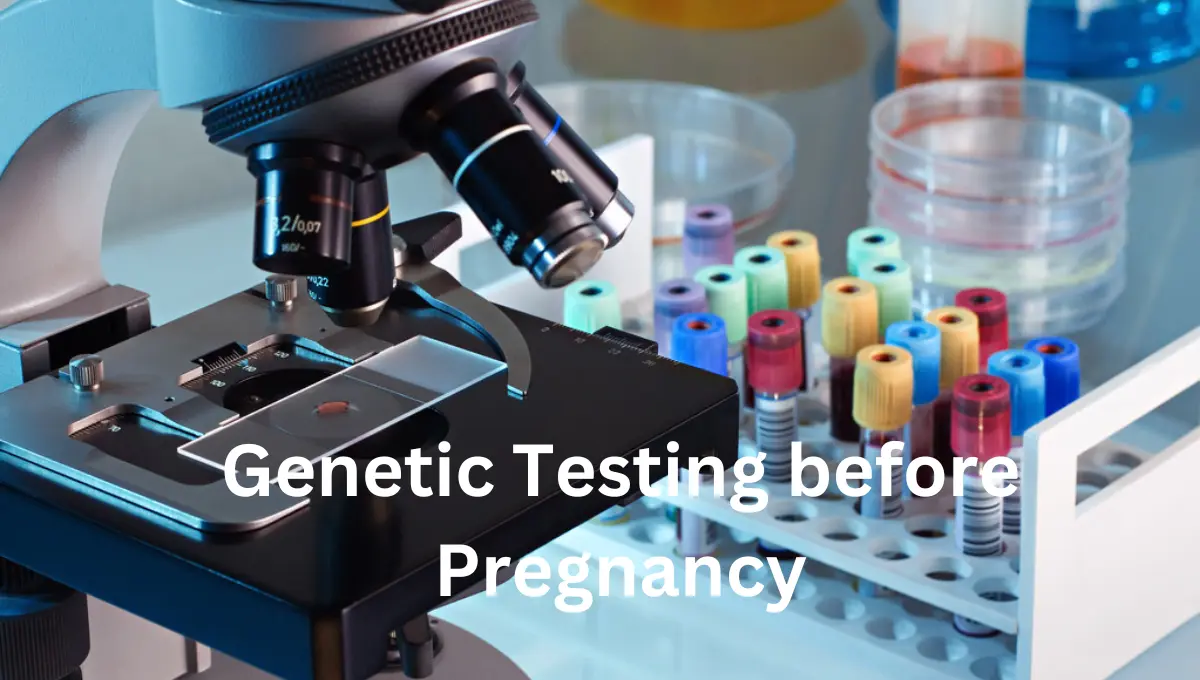
Imagine embarking on a journey with a map that helps you avoid pitfalls and guides you toward a smoother path. Genetic testing before pregnancy is that map, offering invaluable insights into your family planning voyage. This modern marvel provides a wealth of information that empowers couples to make informed decisions. Join me as we explore the compelling reasons why genetic testing before pregnancy is a crucial step.
Related: How Do Celebrities Lose Weight Fast After Pregnancy?
What is Genetic Testing before Pregnancy?

Preconception genetic testing, also known as carrier screening, is a type of genetic test that can determine if you or your partner are carriers of certain genetic disorders. This test can be done before pregnancy to assess the risk of passing a genetic disorder to your baby. Carrier screening can be done through a blood sample or tissue sample swabbed from inside the cheek. The test analyzes a person’s DNA to see if they are a carrier for a genetic condition. Being a carrier means you have the gene inside your cells, but you don’t have the condition, or you have very mild symptoms. You could pass on the gene without knowing you have it.
Preconception genetic testing can help you and your partner understand the chances of passing a disease along to your baby, and give you some options for how to proceed. It is recommended for couples who have a family or personal medical history of genetic disorders, because having a known history is the most significant risk factor.
Related: What To Say To Someone Who Had A Miscarriage?
What Genetic Conditions can you be tested for?
There are many genetic conditions that can be tested for before pregnancy. Here are some of the most common genetic diseases that can be tested for:
- Cystic fibrosis (CF) – a condition that affects breathing and digestion.
- Fragile X syndrome – a genetic condition that causes intellectual disability, behavioral and learning challenges, and various physical characteristics.
- Blood disorders such as sickle cell disease – a group of inherited red blood cell disorders.
- Tay-Sachs disease – a rare, inherited disorder that progressively destroys nerve cells in the brain and spinal cord.
- Spinal muscular atrophy (SMA) – a genetic disease that affects the nervous system and muscles, causing muscle weakness and atrophy.
- Thalassemia – a group of inherited blood disorders that affect the production of hemoglobin, a protein in red blood cells that carries oxygen.
- Canavan disease – a rare, inherited disorder that affects the breakdown and use of aspartic acid in the brain.
- Gaucher disease – a rare, inherited disorder that affects the breakdown and storage of certain fats in the body.
- Niemann-Pick disease – a group of inherited disorders that affect the breakdown and storage of fats in the body.
- Pompe disease – a rare, inherited disorder that affects the breakdown and storage of glycogen in the body.
It’s important to note that there are many other genetic conditions that can be tested for, and the specific tests recommended may vary depending on factors such as family history, ethnicity, and other risk factors. It’s recommended to discuss the benefits and limitations of each carrier screening approach with your healthcare provider or a genetic counselor before testing.
Related: Are Cramps After Period Normal?
What are the benefits of Genetic Testing before Pregnancy?

Here are some benefits of preconception genetic testing:
- Relief from uncertainty: Preconception genetic testing can help relieve the uncertainty of not knowing if you or your partner carry a genetic disorder that could be passed on to your child.
- Understanding reproductive risk: Preconception genetic testing can help you and your partner understand the chances of passing a disease along to your baby, and give you some options for how to proceed.
- Estimating chances of genetic conditions: The test analyzes a person’s DNA to see if they are a carrier for a genetic condition. Being a carrier means you have the gene inside your cells, but you don’t have the condition, or you have very mild symptoms. You could pass on the gene without knowing you have it.
- Assessing overall risk: Preconception genetic testing can help assess your overall risk of having a child with a genetic disorder. It is recommended for couples who have a family or personal medical history of genetic disorders, because having a known history is the most significant risk factor.
Related: Can A Pregnant Woman Swim In A Chlorine Pool?
What are the cons of Genetic Testing before Pregnancy?
Here are some cons of preconception genetic testing:
- Emotional impact: Genetic testing can uncover unexpected results or reveal the presence of genetic disorders, which can have a significant emotional impact on individuals and couples. Receiving a positive result for a genetic disorder can cause stress, anxiety, and grief, as it may require difficult decisions regarding family planning.
- False positives and negatives: No genetic test is 100% accurate. There is a possibility of false-positive or false-negative results, which can lead to unnecessary worry or a false sense of security. It is important to understand the limitations and potential inaccuracies of genetic testing.
- Ethical dilemmas: Genetic testing raises ethical questions, such as the potential for discrimination based on genetic information. There are concerns about privacy, confidentiality, and the potential misuse of genetic information by employers, insurers, or other entities.
- Cost and accessibility: Genetic testing can be expensive, and not all tests may be covered by insurance. The cost of testing can vary depending on the type of test and the laboratory conducting it. Accessibility to genetic testing may also be limited in certain regions or healthcare systems.
Related: How To Stimulate Nipples To Induce Labor?
What is the process of doing Genetic Testing?
Genetic testing involves a simple process:
- Consultation: Initiate a conversation with a genetic counselor or healthcare provider to discuss your family history and concerns.
- Sample Collection: A blood or saliva sample is collected for analysis.
- Laboratory Analysis: Experts examine the sample to identify any genetic variations or mutations.
- Interpretation: The results are interpreted in the context of your health and potential risks.
What does the Genetic Testing results mean?
Genetic testing results fall into three categories:
- Negative: Reassuring news, indicating no significant genetic risks.
- Positive: Identification of genetic variants that may pose risks, prompting the need for further evaluation.
- Variant of Uncertain Significance: Additional research is required to determine the impact of certain genetic variations.
What are the concerns addressed through Genetic Testing?
Genetic testing is a powerful tool for addressing various concerns:
- Carrier Screening: Discover if you carry genes for inheritable conditions like cystic fibrosis or sickle cell anemia.
- Chromosomal Abnormalities: Detect chromosomal issues like Down syndrome, aiding in prenatal planning.
- Inherited Conditions: Uncover risks of passing on hereditary diseases such as Huntington’s disease.
How does it empower your Pregnancy journey?
Genetic testing offers a range of benefits during pregnancy:
- Early Intervention: Detect potential issues early, allowing for timely interventions and specialized care.
- Reduced Anxiety: Clearer insights can alleviate anxieties related to the unknown.
- Knowledge is Power: Armed with information, you can collaborate effectively with healthcare providers.
Does the Genetic Testing involves emotional aspect?
Genetic testing isn’t just about data; it’s about emotions, hopes, and dreams. It empowers you to make choices that align with your values and aspirations. Just as a ship needs a steady compass, genetic testing provides direction on your voyage to parenthood.
What is the cost of Genetic Testing before Pregnancy?

The cost of genetic testing for pregnancy can range from less than $100 to over $1,000. However, most tests are covered by insurance, particularly if the pregnancy is considered high risk for a genetic or chromosome condition. Even low-risk pregnancies may be covered by insurance. The cost of the procedure can range from several hundred dollars to over $1,000. Genetic testing that utilizes newer technology, such as whole exome sequencing, will have a higher cost than tests that have been around for a long time, such as serum screening. Laboratories that offer prenatal genetic testing can perform an investigation of your insurance coverage.
Conclusion
Embarking on the journey of parenthood is a profound and life-altering experience. Ensuring a healthy start for your baby begins with understanding the importance of genetic testing before pregnancy. This modern marvel of medical science empowers you with knowledge, allowing you to make informed decisions that can shape the future of your family. By embracing genetic testing, you pave the way for a pregnancy filled with confidence, joy, and the promise of a bright and healthy tomorrow.
Frequently Asked Questions (FAQs)
Is genetic testing mandatory before pregnancy?
Genetic testing isn’t mandatory, but it offers invaluable insights for informed family planning.
Can genetic testing predict all potential health issues?
While genetic testing provides significant insights, it may not cover every possible health issue.
Is genetic testing only for couples with a family history of genetic conditions?
No, genetic testing is beneficial for all couples, as it can unveil unexpected risks.
Are genetic testing results 100% accurate?
Genetic testing is highly accurate, but like all tests, there is a small margin for error.
How does genetic testing impact family decisions?
Genetic testing equips families with information that influences decisions about pregnancy and healthcare.











